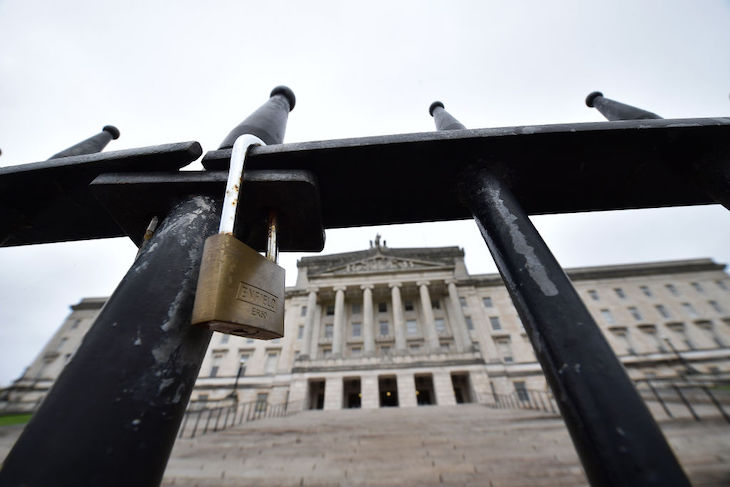It is a question all good cardiologists must ask themselves every day: when do you stop trying to resuscitate the patient on the operating table? The same question could be asked of Stormont, Northern Ireland’s ever crisis ridden legislature: when do we stop bothering?
In the latest round of life-saving treatment, His Majesty the King, Rishi Sunak and EU Commission president Ursula von der Leyen assembled at Windsor to proclaim a new dawn and the remaking of the Northern Ireland Protocol. And, hopefully, another end to the latest Stormont boycott.
The deal unveiled this week will, we’re told, ensure the uninterrupted flow of Scottish seed potatoes and Asda sausages to Ulster. But it doesn’t address the far more fundamental existential question. Is Stormont, supposedly the linchpin of the Good Friday Agreement, anything more than a vanity talking shop?
Stormont’s primary function is to carve up the largesse handed over by the English authorities
For a third of its so-called existence, since its inception in 1999, Stormont has been wilfully suspended by its main participants, David Trimble’s Unionists, the DUP or Sinn Fein, with either side bringing the house down for their own aims. It was paused for five years, between 2002-2007; then three years, between 2017-2020; and the latest hiatus, which is still going on, started last year. If Stormont was a theatre it would long ago have gone bust. If the main players don’t care, why should we?
Tellingly, there is no evidence that governance of Northern Ireland worsens when the blue benches of the Stormont assembly chamber go dark. Belfast city centre is in the continuing grip of a speculative hotel building boom. The lights are on; the unemployment rate is less than 2.8 per cent; the waiting times in A&E compare favourably to those in England; and the A Level pass scores, thanks, no doubt, to the retention of grammar schools, is the highest in the UK.
Can these relative successes can be attributed to the work of the Stormont Assembly? Hardly. They are the fruit of the English Exchequer’s multi-billion pound subsidy, which amounts to a fiscal deficit of £10,000 per head, for every single one of His Majesty’s 1.8 million Northern Irish subjects.
The Crown and the English Exchequer retain control of all important powers, taxation, state benefits, finance, defence, foreign affairs and national security, including MI5 with its constant eyes on paramilitaries of all stripes. In the background, the intelligence war against all new incarnations of republican terrorism rumbles on, beyond all Stormont First Ministerial oversight: an understandable caution over recent years, perhaps, given the alleged links between Martin McGuinness and the IRA Army Council.
Direct rule by default by the NI Secretary of State has often proved far superior than the jostling sectarian politics of the local parties. For decades, up until 2020, women in Northern Ireland were denied, on the fiat of the Presbyterian-influenced DUP, the same abortion rights as other UK citizens until the passage of the bill at Westminster.
Without any fiscal responsibility for taxation, Stormont’s primary function is to carve up the largesse handed over by the English authorities and channel the proceeds in as many ways as possible to their own support base. When the locals have been put in charge, they have often pursued ruinous policies, like the Renewable Heating Initiative, essentially designed to defraud the British taxpayer of £500 million to subsidise the Northern Ireland poultry industry.
Northern Ireland is small: the population is 1.8 million, but the quality of political leadership in both the DUP and Sinn Fein is well below their contemporaries in Edinburgh, Dublin or London. Both parties are wedded to their own nostalgic contradictory nationalist visions that run counter to the economic interests of their constituents.
The latest Stormont suspension is grounded in the DUP’s wilful 2016 espousal of the Brexit cause: a referendum result that was lost in Northern Ireland when 60 per cent voted for Remain. But the DUP, unlike the Conservatives, didn’t campaign for Leave out of some euro sceptic animus but to re-define their otherness against the far more prosperous Irish Republic, an EU role model of success. The DUP’s fatal nostalgia is to dream that Northern Ireland is a sovereign place apart, even though the border is 45 miles from Belfast and Dublin just a further 50 miles down the road. And the Republic’s five million people their closest market.
Given the horrors of the Troubles, in which over 3,700 people were murdered – and the impossibility of customs controls on the meandering Irish border – supporting Leave was a wilfully destructive economic decision by the DUP. A foreseeable act of political self-sabotage that unsurprisingly was never in the interests of anyone in Northern Ireland. The Windsor Framework is just another example of outside powers saving the parties of Stormont from their own worst instincts.
Sinn Fein are no better than the EU. The party is forever promoting its utopian doctrine of a united Ireland, but never explaining who will fund and subsidise the ruinous finances of the Northern Irish economy in the absence of the British taxpayer.
Instead of leading the way to pragmatic consensual policies, Stormont freezes these lines of sectarian division; it ensures only a cold peace. Come election time, both the DUP and Sinn Fein compete for votes in their own communities in auctions of intransigence, each side vowing to never give an inch. Stormont’s inbuilt D’Hondt cross-community power sharing formulas reward their political irresponsibility by handing them both absolute veto powers. There is no pain in failure. Even their salaries are still paid. The DUP is more powerful now out of office than it will be back in Stormont.
By any measure, Stormont, after 23 years in and out of existence, has failed the people of Northern Ireland. Perhaps it is time, like that cardiologist, to conclude that this corpse on the table is not worth saving again.






Comments